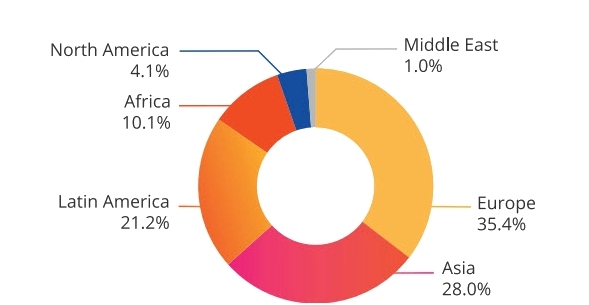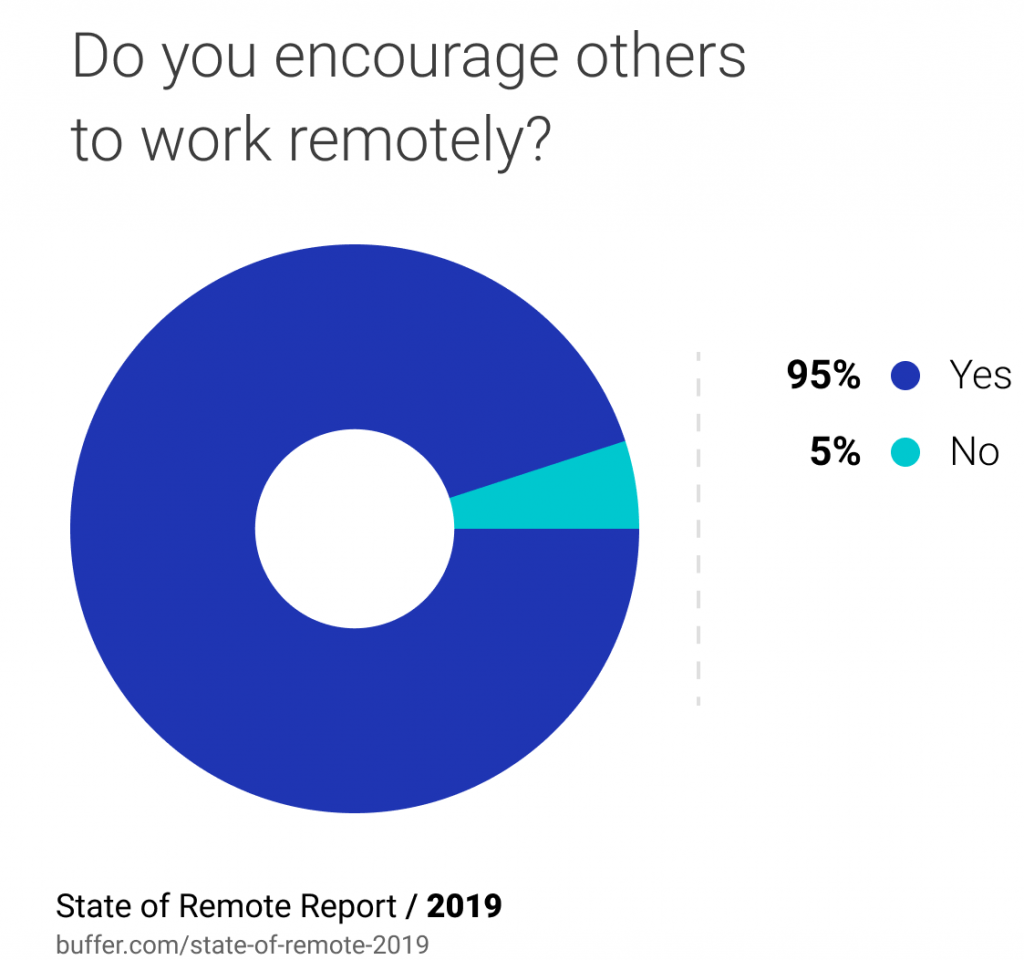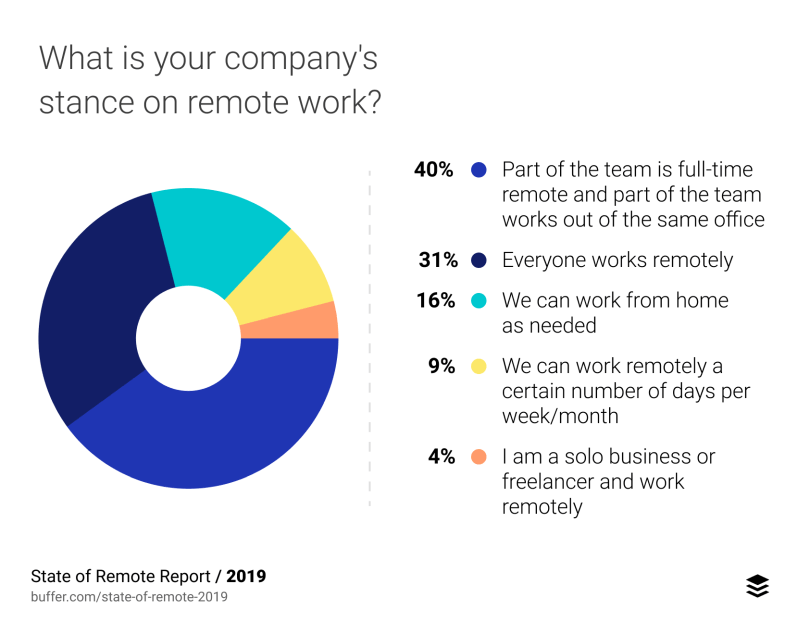Recently, working remotely has grown dramatically in popularity primarily because it gives workers a lot more freedom and saves companies money. However, is this just a trend that will soon dissipate, or is it here to stay? The numbers speak for themselves.
Remote work will soon become the new norm, as per a report from GetApp the number of people working remotely on a weekly basis has grown by nearly 400% in the last decade.
Still, many that have yet to take on the challenge of working from home are wondering if remote work salary is worth it.
Of course, the answer to this isn’t as simple as 1, 2, 3. In reality, the salary you make working from home depends much on your experience, knowledge, the field you are working in, and the company that hires you.
Here are some scenarios, facts, and a couple of tips for getting the top remote work salary.
Remote work salary cut or stay in-office?
A part of the shift to more companies choosing to have remote workers is to offer their current employees the opportunity to choose their preferred workspace.
Although most companies see the benefit of this and may even raise the employee’s salary, others may offer a salary cut.
With that in mind, would it be worth it if your employer offered you a salary cut so you could stay at home to work?
Of course, many factors need to be considered first:
- Do the math; how much will you be saving on commuting expenses?
- How much do you spend daily on lunch and snacks?
- Do you have children? Consider the money you would save on childcare if you were home.
- How much is the cut? Will you be able to cover your bills?
These are some of the points to consider before answering your employer.
Especially if you have children who require paid childcare while you are at work. Consider the money you will be saving if you could spend more time with them while working. On the other hand, keep in mind that staying organized and working with children around is a task of its own.
Another benefit is that if you stay organized and finish work faster, you can easily tackle household chores, spend more time with your family, and still complete all of your work with ease.
34% of survey respondents of the survey conducted by OWL Labs would take a pay cut of up to 5% in order to work remotely.
How is remote work salary determined?
Calculating the salary of remote employees is a rather broad topic, as a variety of jobs are possible through remote work. When a company decides to hire an employee and sets aside a budget for salary, it considers many factors, such as:
- Industry
- Experience
- Skills
- Pay clout
- Reputation
- Education and certifications.
Another factor that may affect the salary is the location. Even though the wages of remote workers are based on above factors, companies still consider the location of these individuals when hiring.
Say a company in the UK is hiring a worker from Bulgaria. Regardless of her experience and knowledge, the company will most likely offer the worker a salary that corresponds to Bulgaria’s standard. At the same time, it would pay more to its UK-based workers.
Hiring international workers saves companies a lot of money as there are many high-qualified employees available in countries that have a lower cost of living. Sometimes you can even see this kind of difference in salary rates from city to city within a single country.
Companies take into account national minimum wages and local pay rates when contracting a remote worker.
Remote worker locations and pay rates
Understanding your competition will help you land a freelance or remote job. Keep in mind that as a remote worker, you are hired by a company as an ongoing employee, or given the opportunity to work from home for the company that already employs you.
Being a freelancer is slightly different. They are hired to work on a particular project or task and may work for several companies at once.
Below you will find some statistics reported by The Payoneer Freelancer Income Survey carried out in 2018. It covers 170 countries and 21,000 freelancers and remote workers.
Where do remote workers and freelancers live?
- 4% in North America
- 21.2% in Latin America
- 35.4% in Europe
- 10.1% in Africa
- 1.0% in the Middle East
- 28% in Asia.

Img Source: Payoneer
Where are companies that hire remote workers based?
- 68% in North America
- 7% in Latin America
- 51% in Europe
- 7% in Africa
- 9% in the Middle East
- 18% in Asia
- 15% in Australia.
These numbers speak for themselves. North America hires a lot of international workers as the majority of workers in the US are not freelancers or remote workers. Remote hiring allows them to save money on wages.
Still, working for a company based in the UK, Canada, or North America will offer you a much higher paying rate than companies in other parts of the world. UK companies are known to provide the highest paying opportunities for remote workers.
The average earnings are difficult to pinpoint precisely, especially since the survey has a basic average for all fields together. The highest percent of freelancers (24%) make anywhere between $6-10 per hour, about 17% of them make $11-15, and 16% make as little as $5 per hour.
Keep in mind that this is a worldwide average. Only 4% of remote workers who use Payoneer are paid $51-100 per hour.
Generally, most of the remote workers make about as much as in-office employees in their niche and should demand and expect equal pay. However, unlike in-office employees, they can save a substantial amount of money on eating at home, not using the car to get to the office, and, of course, a lot of time for not commuting every day.
The highest paying remote workers work in legal fields with an average pay of $28 per hour. IT professionals, engineers, designers, finance managers, sales and marketing employees, and writers earn around $16-$21 per hour. Administrative and customer support workers make approximately $11 per hour.
Remote workers statistics
Every year, the State of Remote Work Report gives insight as to the remote workers’ industry. The most recent survey by Buffer asked 2,500 remote workers and teamed up with several companies that either employ remote workers only or have a high percentage of them.
The findings are quite impressive – 99% of surveyed workers answered that they would like to continue working remotely for the rest of their lives, and 95% would recommend others to start working remotely. That said, it is safe to say that remote workers are here to stay.

Img Source: Buffer
When asked what the most beneficial point of working remotely is, 40% of workers answered that the flexible schedule does the trick. Other benefits include working from any location (30% of respondents) and time with the family (14%).
Employees enjoy the opportunity to have a meaningful experience while working. They can juggle work, time with family and friends, and their hobbies without it affecting their salary and the quality of work.
Struggles, vacation, and travel time
Working remotely doesn’t come without challenges. The main issues include concentrating and getting organized while at home with all the possible distractions, staying motivated, and unplugging after work.
Here are some numbers to get a clear picture:
- 22% have a hard time unplugging after work
- 19% feel loneliness
- 17% have difficulties collaborating and communicating with their team
- 10% have difficulty fighting distractions at home
- 8% find motivation and dealing with different time zones most difficult
- 7% have a hard time finding time for a vacation
- 4% have other struggles not on the list
- 3% have difficulties with reliable Wi-Fi.
Further research shows that vacation time doesn’t seem to be a problem for most. A total of 32% of remote workers answered that they have unlimited vacation, while only 8% said they have no vacation time offered by their company.
Of those that do have vacation available, only 22% took a two-week vacation, while only 5% took more than six weeks of vacation.
Working remotely allows you to work anywhere you like. Many people use this as an opportunity to catch up on travel. About 2% said they always travel while working, while 44% work and travel about one week to one month per year.
Still, 84% of respondents said they prefer working from home, while the rest prefer co-working spaces and coffee shops.
Statistics of companies with remote employees
Some companies are entirely remote, while others have a specific percentage of remote workers. About 40% belong to the latter group, while 31% are fully remote.

Img Source: Buffer
Although most companies do not cover any of the costs that come with working remotely, such as the internet and co-working spaces, some take the extra step to encourage their workers by offering different benefits.
About 18% of companies pay for the workers’ internet and 23% cover co-working space memberships. On the other hand, 87% of companies do not reimburse the expenses of working in coffee shops.
Remote workers vs. in-house workers – Happiness comparison
Of course, remote work may not be for everyone. Have you ever wondered how many people are, in fact, happy to work remotely?
It’s pretty clear that remote workers love their job and would recommend others to work remotely as well, but what makes it so much better?
In reality, it’s all a matter of making your job work for you. Rather than heading to an office outside of your comfort zone to work, you create your office where you feel most comfortable.
This, combined with competitive salaries, travel opportunities, and you taking charge, are the main reasons why remote workers feel happy. Statistics show that 41% of them chose to work remotely simply because they wanted to decide where they work from.
A happy employee means more productivity and better results.
Deciding if remote work is for you

Aside from the personal preferences of whether you want to work among your co-workers or remotely, there are plenty of other factors that may help you make your choice. Before even looking for a remote job, consider main working skills for remote work, the struggles listed above and whether you are ready to overcome them. After that, it’s a matter of what skills you have to offer and if they are sought after.
An essential skill you must have is basic digital communication knowledge and experience. You will be communicating exclusively online, rarely over the phone, and will most likely use a variety of organizational and communication tools.
Many companies work with a variety of online collaboration software that you need to be familiar with before you start working.
To decide what direction you need to go, consider the following:
- What are you good at? What are your unique talents, experience, and knowledge? What do you have to offer to the table?
- What do you genuinely enjoy doing and can you offer it online? Motivation can be difficult when you don’t work something that you love.
- Is there a demand for the skill you are offering? Surely, there is always someone out there who may need your skills, but can you make enough from your expertise?
- What is the salary you need to fit your lifestyle? This is an obvious point that most overlook.
US average of the most popular remote jobs
Most of the statistics available are related to US remote workers. This is rather unfortunate because, as we mentioned above, only 4% of freelancers are from the US. It means that numbers may be slightly different worldwide.
In any case, here are the highest-paid online jobs of 2019:
- Marketing manager – $63,250
- Forensic computer analyst – $70,155
- Attorney – $81,439
- IT manager – $82,054
- User experience researcher – $82,865
- Business analyst – $83,142
- District sales manager – $90,000 + bonuses
- DevOps manager – $91,339
- Customer service engineer – $100,000 + benefits
- Software developer – $115,462.
As you can clearly see by these numbers, in comparison to the US average salary by state, it can be quite beneficial to work remotely.
Bottom line
Although remote work may not be for everyone, especially for social butterflies that like the hum of an office, it is quickly growing as the new norm.
Remote workers choose to work out of the office for different reasons, but most do it because they like to choose where they work.
Still, there are plenty of struggles. The primary battle is the inability to unplug after work and allowing work to dip into remote workers’ personal lives. Other serious difficulties that most remote employees face are staying organized and time management.
Individual remote workers and companies can take advantage of the time management software. Time Doctor gives you ability to organize your work, track time for current and upcoming tasks, helps you work effortlessly in a team and refrains you from working overtime.
Any company working toward a smooth transition to remote workers would find management software such as this crucial.
About The Author:




